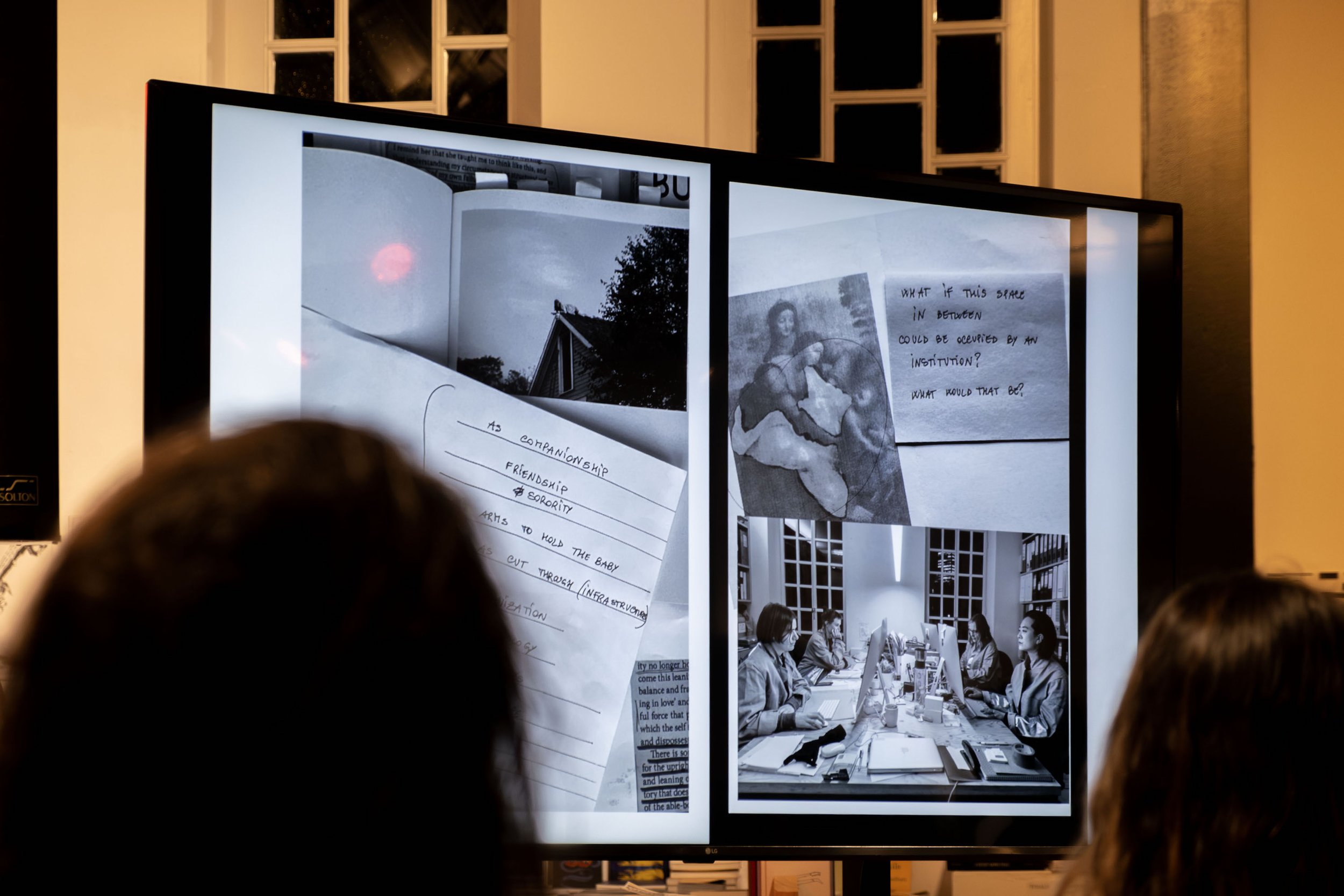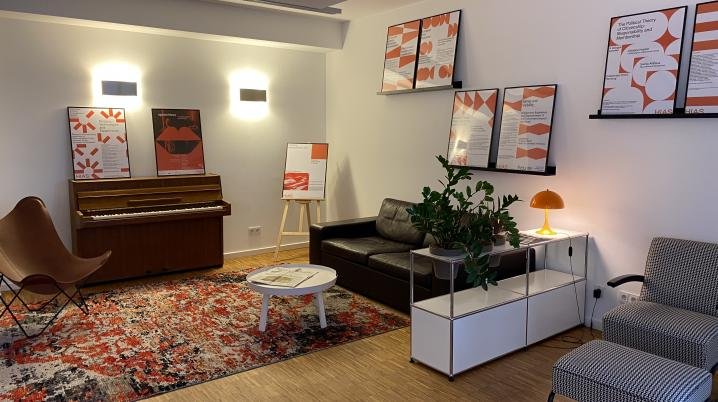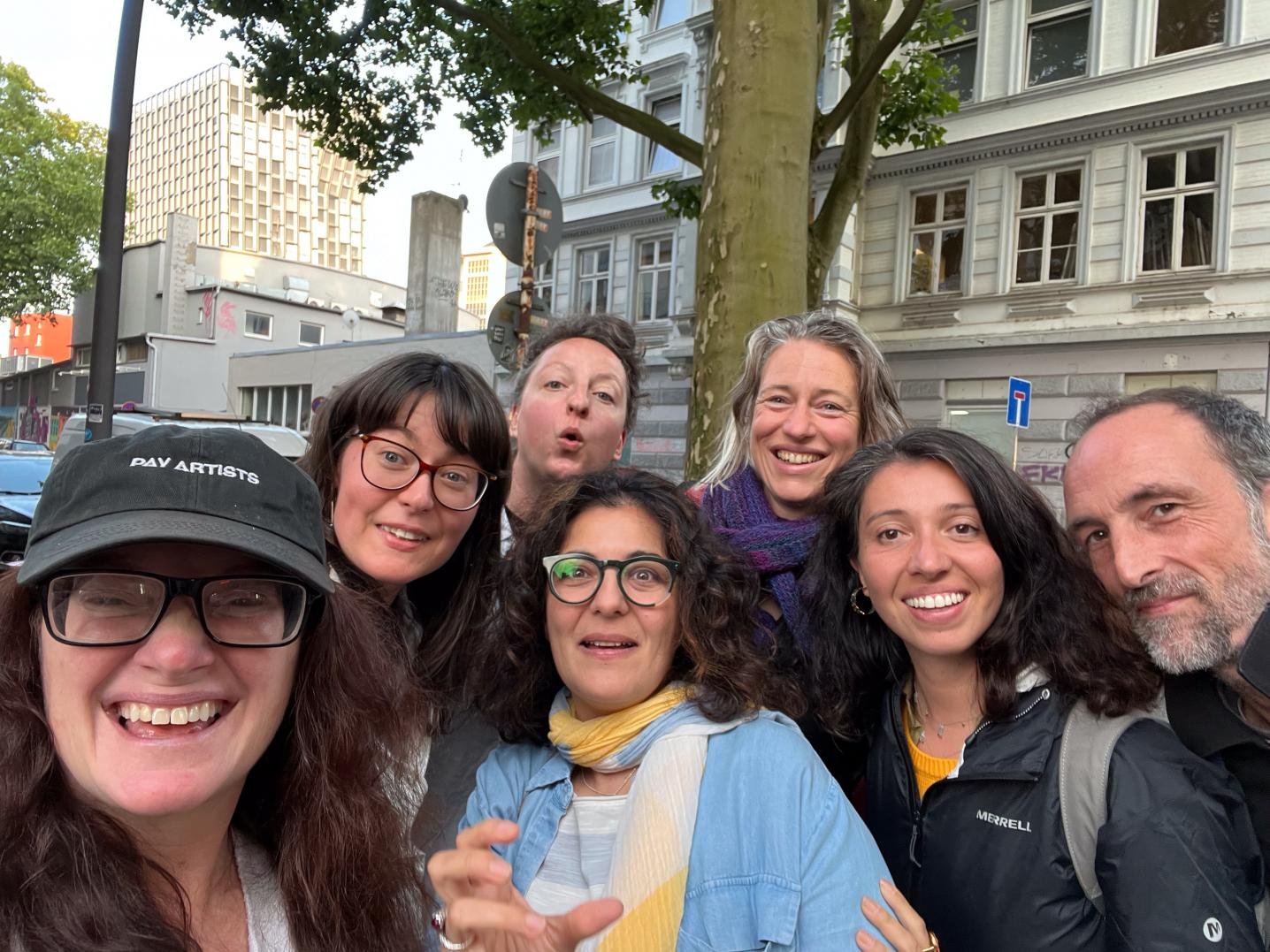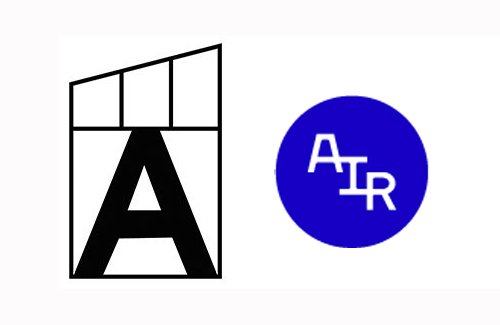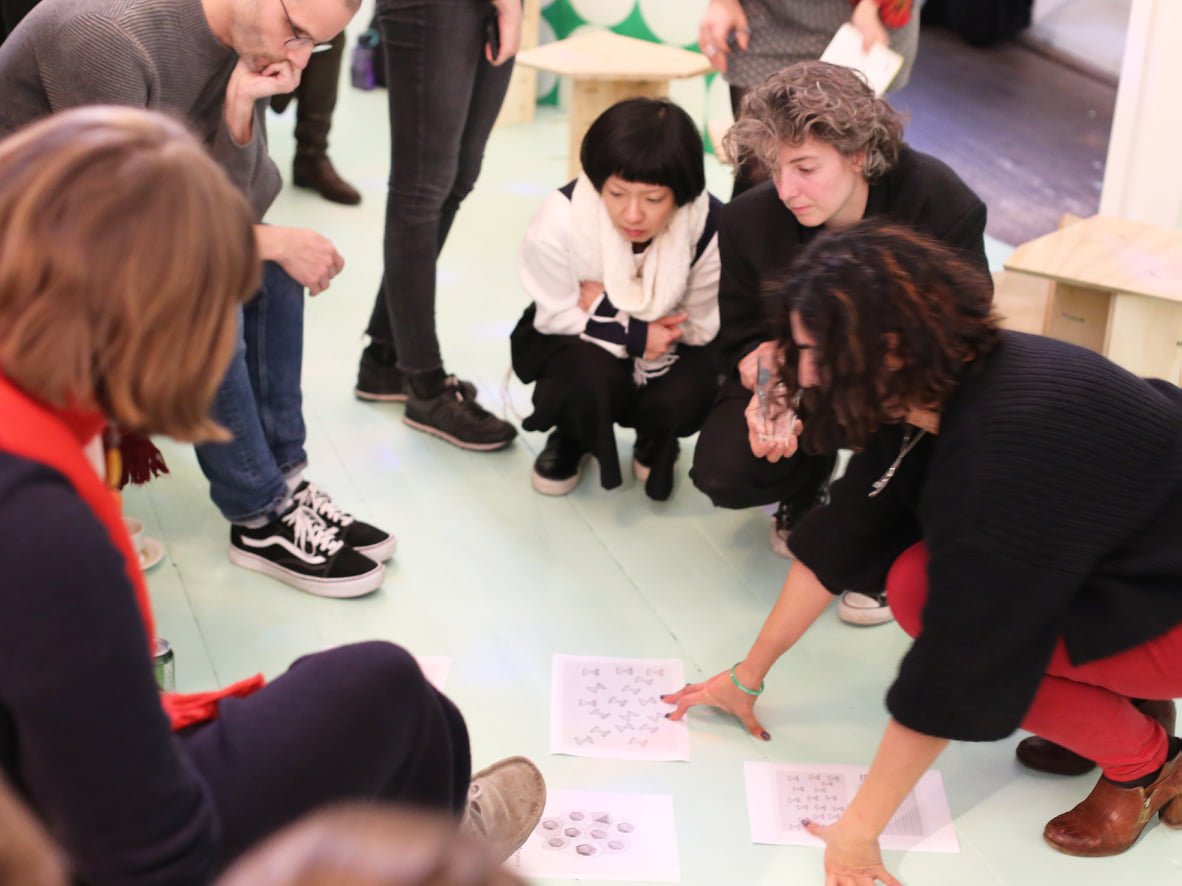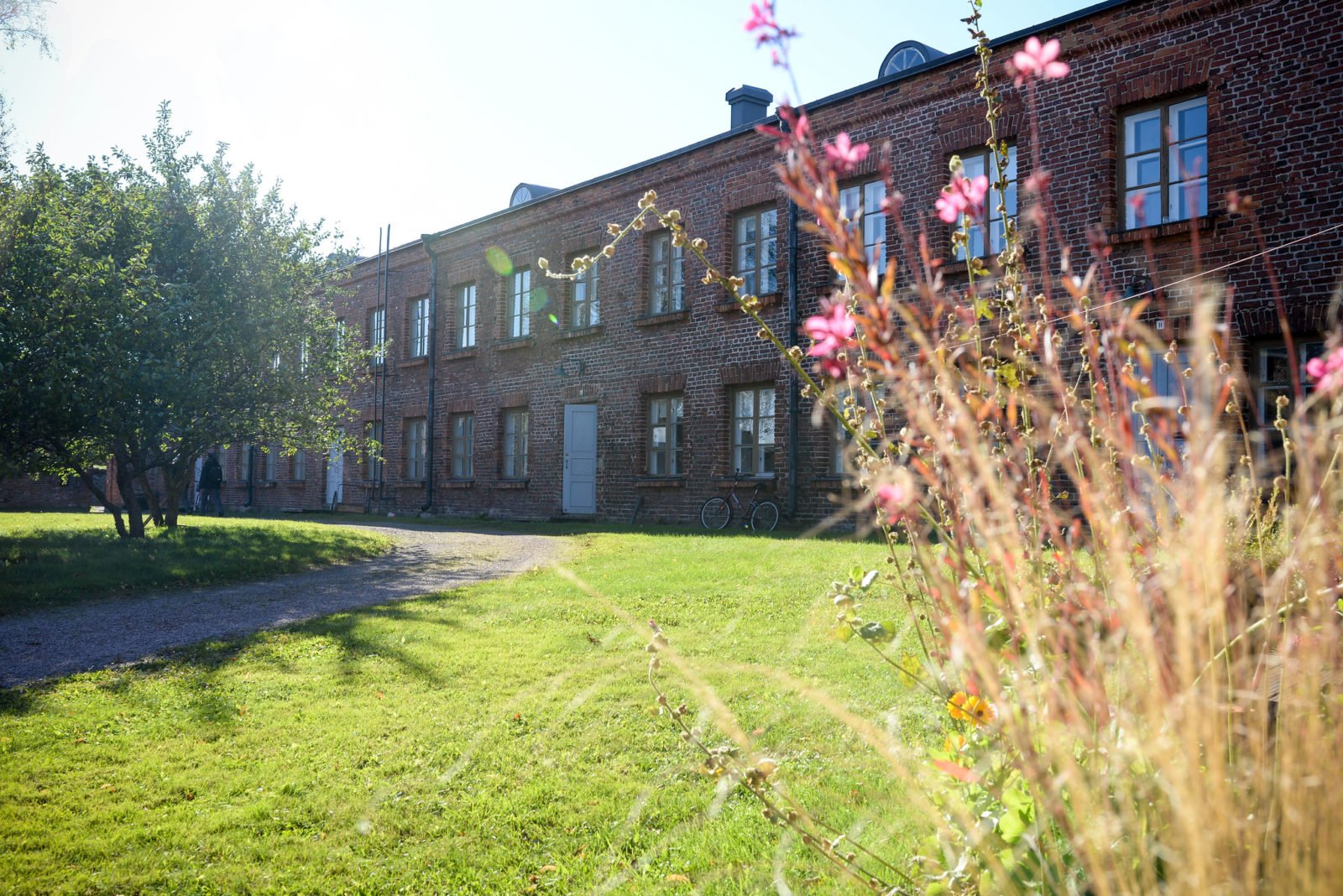Reading on Responsibility – with excerpts from “Between the Standing and the Inclined”
Reading on Responsibility – with excerpts from “Between the Standing and the Inclined: structures supporting change”, with Maja Bekan at SEA Foundation, Tilburg (25 April, 2024).
For SEA Foundation’s fold #10 Responsibility, we suggested reading Judith Butler’s essay Leaning Out, Caught in the Fall: Interdependency and Ethics in Cavarero, and excerpts from “Between the Standing and the Inclined: structures supporting change”.
This reading group event was part of SEA Foundation’s longer-term research of art and sustainability, fold #10 Responsibility. It was moderated by Michaela Davidova.
Il Popolo delle Donne - with Yuri Ancarani
Il popolo delle donne. di Yuri Ancarani. h. 19:00. Kinetta Labus, Benevento 16 marzo 2024. Ospite il regista Yuri Ancarani.
Launches events "Between the Standing and the Inclined", Kunstlicht Issue Vol.44, N.4
What is the inclined? Why support structures? And how can these help us speak about change—(because yes, we still want many things around us to be different)? Support is generally intended as something that holds up or serves as a foundation, provides a basis for the existence or subsistence of someone or something, keeps from yielding, and gives comfort. Inspired by Adriana Cavarero’s words, this issue explores 'support' as all that sustains and shapes an art practice—what enables someone to stand as an artist or art professional today, whether in the absence of or despite certain systems, within the gaps of material constraints, transforming these limitations into opportunities for collective action and self-empowerment.
Guest-editors of this issue: Maja Bekan and Angela Serino, with contributions by Manuela Zammit and Alina Lupu, Patricia H. McMeans, Eleonore Pano-Zavaroni and Kathrin Wolkowicz, Multiple Choice, Irena Borić, Mari Kalabegashvili, Gunndís Ýr Finnbogadóttir, Yasmine Ostendorf-Rodriguez, toni kritzer.
Kunstlicht is a Dutch academic journal focusing on art, visual culture, and architecture.
Launch events were held at Casco Art Institute in Utrecht with presentations by artists toni kritzer and Patricia H. McMeans (20 January, 2024), and at Framer Framed in Amsterdam featuring art critic Manuela Zammit and artists Alina Lupu, Rumiko Hagiwara and Bea Mc Mahon from Multiple Choice, and Kathrin Wolkowicz (21 February, 2024).
Kunstlicht launch at Framer Framed. Ph.: Balanslab
Kunstlicht launch at Framer Framed. Ph.: Balanslab
Kunstlicht launch at Framer Framed. Ph.: Balanslab
Kunstlicht launch at Framer Framed. Maja Bekan, Alina Lupu, Manuela Zammit, Angela Serino, Kathrin Wolkowicz. Ph.: Balanslab
Kunstlicht launch at Framer Framed. “Hooray Everyone!” by Multiple Choice (video). Ph.: Balanslab
Kunstlicht launch at Framer Framed. “Hooray Everyone!” by Multiple Choice (video). Ph.: Balanslab
Kunstlicht launch at CASCO. Note by a spectator.
“Towards Permacultural Institutions: Curating Transformation”–Allyship
“Towards Permacultural Institutions: Curating Transformation”, Temporary Gallery – Center for Contemporary Art, Cologne (DE), 20-21 October, 2023.
“Towards Permacultural Institutions: Curating Transformation” is a series of workshops curated by Aneta Rostkowska and Nada Rosa Schroer, in cooperation with the medienwerk.nrw network. Inspired by permacultural practices, on this occasion I facilitated a workshop with invited participants, focusing on the ‘cultivation of margins’ as a necessary action to foster ‘allyship’.
“Against the backdrop of multiple social and ecological crises, the workshop series “Towards Permacultural Institutions: Curating Transformation” takes reflections on the application of permacultural principles in the cultural sector as the starting point for a three-part workshop series. The focus is on the question of what role art institutions can play in urgent transformation processes towards an ecologically just and decolonial society and what options they have for action.
What does it mean for art institutions to put themselves at the service of environmental activism and the climate justice movement? The first workshop on allyship will explore the possibility of supporting local groups organizers, and look for ways to build reciprocal relationships between actors and communities in the so-called Global South and North. What are the first steps towards decolonial allyship?” (Aneta Rostkowska and Nada Rosa Schroer).
Invited guests: Antonia Alampi, Jakeline Romero Epiayú, Chihiro Geuzebroek, Camilo Pachón, Ela Spalding, Angela Serino, AMA TWI.
CAT (Constructive Advance Thinking) Research Group at HIAS, Hamburg (D). Image: Dutch Culture
“A Transformation Framework for Artist Residencies” –Hamburg HIAS
“A Transformation Framework for Artist Residencies”, International Research Meeting, Hamburg HIAS Institute for Advanced Study. (2–8 July).
Together with Kathryn Roberts (University of Groninger), Bojana Panevska (DutchCulture | TransArtists) and ARRC members Pau Cata, Miriam La Rosa, Patricia Healy McMeans, I am part of the collaborative research project “A Transformation Framework for Artist Residencies”.
This project aims to open up the emerging research field by diversifying knowledge about contemporary artist residencies and developing research agendas for future use. In particular, the research explores the following three themes: ● Contemporary challenges/Internal critiques: How have organisers and artists conceptualised the challenges facing residencies today, and how have they responded in their own practices? ● (Counter)histories: How have residencies changed over time, and what alternative histories of travel, hospitality, and exchange might inform the residencies of the future? ● New trajectories: How are residencies redefining the limitations of geo-political borders and unequal resources, and encouraging meaningful community participation?
The research combines intensive residency stays in Hamburg, Madrid, and Montpellier, alongside online work, including a series of interviews with selected residency participants and organizations, among others. Our first meeting took place at Hamburg HIAS Institute for Advanced Study over one week in July.
You can read more about the project on DutchCulture | TransArtists website here. And on the research stay in Hamburg here.
The project is made possible by the Constructive Advanced Thinking (CAT) Program of NetIAS, the Network of European Institutes for Advanced Study, which is supporting a series of four research residencies over a three-year period (2023-2025). Research visits have taken place at the Hamburg Institute of Advanced Study (HIAS) in 2023 (2 – 7 July) and the Madrid Institute for Advanced Study (MIAS) in 2024 (8 – 15 September).
Image: Dutch Culture
Image: Dutch Culture
Image: Dutch Culture
Image: Dutch Culture
Image: Dutch Culture
The Art Residency Research Newtork at Res Artis Online Conference
Res Artis Online Conference 2021 Bangkok
Defining the Next Decade 8 – 17 September 2021
Date: 10 September 2021
Res Artis is a 28 year old network of arts residency operators from around the globe. It comprises more than 550 members in over 75 countries. It is now based in Melbourne, Australia, after having been located for several decades in Amsterdam, The Netherlands. In 2021, Res Artist organized a fully digital conference titled ‘Defining the Next Decade’ with a focus on the impact of COVID-19 and the future of the international arts residencies field.
Together with Miriam La Rosa (Australia), Pau Catà (Spain), Morag Iles (UK) and Patricia Healy McMeans (USA), we presented the ARRN network and our experience of how holding regular virtual meetings have provided a space for production and self-reflection, care and trust.
We touched on themes of presenciliality (the condition of 'being present’), chrono diversity, radical hospitality and cross-cultural resonance, the perception of space and the creative act as embedded in wider ecologies.
You can watch the recording of the presentation online on Res Artis You Tube channel here.
The conference was hosted by SAC Gallery, in Bangkok, Thailand and supported by ASEF culture360; KONNECT ASEAN, ASEAN Foundation; Goethe-Institut Thailand; Japan Foundation, Bangkok and Casa Asia
(press-release excerpt)
Titled Defining the Next Decade, the conference will examine the tremendous impact of COVID-19 and the future of the international arts residencies field. We will present the results of Res Artis survey data and examine new models of arts residencies that have evolved in response to the pandemic. This includes the rise in local exchange, virtual residencies, and digital residency activity that has occurred while physical exchange has been paused. Taking place during diverse time zones spread over two weeks in September, the virtual nature of this conference will reflect new digital residency activity emerging in the field and will offer greater accessibility for attendees and contributors alike. We will offer workshops and presentations from members of the art residency field throughout the world with a particular focus on those based in South East Asia and Thailand. The conference will include opportunities for facilitating small group interactions, artistic offerings as well as tours of Bangkok galleries and residencies tours. This promises to be a digital event unlike any other, in that through its programming and format will address the importance of meaningful “hosting” in the virtual realm.
The Art Residency Research Network at Saari Summer Well
The Art Residency Research Network (ARRN): Our journey coming together as group
Date: 19 August 2021
2020 has been a year of disruption, one in which we have been forced to stand still, hold our breath and experience forced closures and sudden and painful losses. The global pandemic has obstructed human life and suspended our day-to-day routines but it has also generated space for other forms to thrive. Indeed, it has been through our active engagement with the non-human (i.e. the land, the animals and our surroundings) that virtuality and ecology have acquired new meanings, enhancing the need to get together, share and care, to think and be otherwise. In this context, a small group of researchers and practitioners studying artists’ residencies (Pau Cata, Morag Iles, Miriam La Rosa, Patricia Healy McMeans and Angela Serino) have come together to share research, pique imagination, reflect on how residencies have been affected by the current zeitgeist, look at today’s challenges and importantly define new possible findings to keep with us for the next future. Our gatherings have initially taken the form of virtual meetings, through which we have explored creative online tools that enable us to support and exchange with one another. The invitation to participate at the Saari Summer Well in Finland has made this process of exchange even more relevant, prompting us to turn our working condition into an occasion, a ‘space’, for production and self-reflection. As a constellation of moments and spaces where we get to know each other better, share our artistic and curatorial practices and create in collaboration, we asked ourselves: can our process, based on periodic virtual meetings and the sharing of ideas and resources, be considered an extended hybrid residency? What if we understand our collaborative efforts as a long term virtual-analog opportunity to speculate on a yet-to-become artists’ residency model? We are exploring – in theory and practice, as well as virtually and analogically – the meaning of presenciliality (the condition of 'being present’) and its others, chronodiversity, radical hospitality and cross-cultural resonances, the disruption of habitus, the perception of space and the creative act as embedded in wider ecologies. Keywords: chronodiversity, radical hospitality, emergence, ecologies, residential practice.
Configurations of Time at Saari Summer Well
“Summer Well 2021: My Journey, Research and Exchange, from the practices of art to the theory of residency research”
International gathering curated by Irmeli Kokko at the Saari Residence in Finland.
Dates: 18 - 22 August 2022
Curated by Irmeli Kokko, this gathering brought together sixteen residency researchers from different countries to share and discuss their ongoing research on artists’ in residency.
“This short residency is the first platform that is created for scholars, writers and activists on artist residency research and writing - to come together, to meet each other and share their projects, thoughts and ideas. The title ‘My Journey, Knowledge and Exchange – A short residency’ is derived from the basic three elements of artist residencies - going somewhere else and journey as a method of achieving change: your knowledge coming together in a nod of other knowledges and seeing it and sharing it.” (Irmeli Kokko)
The assembly took place at the Saari Residence, a rural manor house now turned into an international residency, and it was hosted and organized by Kone Foundation. You can find more information about the Saari Residence here.
On the occasion of this gathering, I presented a new version of ‘Configurations of Time: time and residencies’.
The documentation of what takes place in a residency can be partial and fragmented. As the value of what happens often fully blossoms over time, the successions of artists’ (studio) presentations, blog’s entries, web archive, and reports seem to be telling only one story of what happens when we host an artist. Inspired by Lisa Baraitser’s words on the existence and ‘circulation of other types of time, that happens simultaneously in the condition of the now’, we will embark in a short speculative exercise, looking at various kinds of time, each with its own rhythms and processes. What kind of time would we like to keep or start considering in the post-pandemic reality? Which one do we prefer ignoring moving forward with our residencies programs?
You can find a version of this lecture in this video documentation on Vimeo. (See ‘Configurations of Time’ in the section Curated projects).
In addition to my individual contribution, this event was also the occasion of the first public presentation of ARRN, the Art Residency Research Network I co-founded in 2021, with fellow researchers Pau Catà (Barcelona), Morag Iles (Newcastle), Patricia Healy McMeans (Minneapolis) and Angela Serino (Amsterdam). The network brings together five researchers that are committed to explore and self-reflect on the status of residency programs through study and practice.
Configurations of Time at AiR Network Meeting Finland
Date: 8 June, 2021
I was invited to be a guest-speaker to the annual meeting of Finnish residencies. The theme of the online event was a discussion about the residencies’ development in light of unavoidable changes due to by the Covid-19 pandemic and inconsequence, the need to reflect on possible new models.
Press-release and more information here below.
AiR Network Meeting Finland 2021
The event was organized on Zoom on Tuesday June 8 th , 10 am – 4:15
This year’s annual meeting of Finnish residencies will focus on issues relating to the long-term development of the residencies’ operations and theirfuture. The meeting will discuss the role and interfaces of residencies in the field of art now and in the future. In the morning, international residency researchers will give individual presentations on the themes. In the afternoon workshops, we will get together with the experts of the Future Research Center to look at alternative visions of the future, changes in the operating environment and new directions. How can the residency be an active player in making the future and influence the future with its actions and choices?
A meeting of the Finnish residency network is held annually. The focus of the meetings will be on the exchange of information between the actors, peer discussion and development work in the field of residencies. The meeting of 2021 is organized in cooperation with the Studio Foundation of the Finnish Artists’ Association and the Residence of Saari Manor. The event is aimed at residency actors operating in Finland or parties dealing with residency issues.
Welcome aboard!
‘Configurations of Time: Time and Residencies’, by Angela Serino
According to theoretical physicist Carlo Rovelli, time as commonly discussed does not exist in science. On the contrary, what science tells us is that the temporal structure of the world is more complex than a simple linear succession of instants. Time is not one continuum, homogeneous dimension. And space and time are better understood as events and relations.
Looking at Rovelli’s ideas of time, as well as notions of ‘care time’ and ‘soil time’, we will embark into a short speculative exercise to look at various kinds of time, each with its own rhythm and its processes.
What kind of time would you like to keep, and which one you prefer to leave aside when picturing your (post-pandemic) artists-in-residency programme?
Original link and programme here:
https://www.ateljeesaatio.fi/suomen-residenssiverkoston-tapaaminen/
Mindmap of the event
Art residences: Time and the pandemic, Xarxaprod gathering
Date: 10 December 2020
I took part in the online presentation and panel discussion for ‘Art residences: Time and the pandemic’, a virtual gathering organized by Xarxaprod, the network of artistic production centers of Catalonia, Spain. The event was curated by Pau Cata, and the guests of the morning session were Raquel Friera and Xavier Bassas, founders of Instituto del Tiempo Suspendido, Oscar Dasí, director of La Caldera and myself.
The gathering aimed at showcasing best practices in the field of art residencies, with a particular attention to a trans-national and post-virtual perspective in order to envision new modes to understand art residencies. The panel conversation I took part in revolved around experimental perspectives on time and alternative institutional structures.
You can find the summary of the whole event here:
On Youtube: https://www.youtube.com/watch?v=FbUTN70DC24 (Language: Catalan)
Written report available here (Language: Spanish/Catalan).
Xarxaprod, the network of artistic production centers of Catalonia, is an association that brings together both public and private centers that work for contemporary cultural production. Founded in 2006, the main goal of Xarxaprod is to share and optimize the resources available for cultural producers and to promote their relationship with society. Xarxaprod is based in Barcelona. Official website: https://xarxaprod.cat/.
Time and Residencies at Hotel Maria Kapel for “Solid Care”
Date: 30th October, 2019
Presentation on ‘Time and Residencies’ in the framework of ‘Solid Care’, one-day conversation on residencies as spaces of care at Hotel Maria Kapel, Hoorn (NL) [Link:https://www.hotelmariakapel.nl/]
Invited by: Miriam Wistreich, Maja Bekan
[Invitation letter]
Dear Angela,
We would like to invite you to contribute and to participate in or coming public event:
Solid Care - A one-day conversation on residencies as spaces of care at Hotel Maria Kapel on 30th October 2019 from 15.00-18.00 (please see further information below).
After 15 years of changing artistic leadership, and after having hosted dozens of artists in residence, Hotel Maria Kapel is taking time to reexamine how we work. This year is a year of reflection, repositioning and maintenance in which we try to understand how we work and how we might work better to serve our communities with energy and care.
In April 2019 the board of Hotel Maria Kapel appointed a committee of female artistic directors, Maja Bekan, Griet Menschaert and Miriam Wistreich to undertake this investigation and develop the artistic programme. As our first project we have invited artists Kevin Hunt and Harriet Rose Morley to reimagine the spaces of HMK.
The conversation event will mark the opening of the newly refurbished HMK space and reflect on the concept of caring in an institutional context, especially in the context of running an artist residency. We reach out to you because of your very inspiring text “Cultivating Time” in Unpacking residencies: Situating the production of cultural relations (2018) and your first hand knowledge in working with and in art residency. It would be wonderful to have your unique experience and your very interesting proposal to rethink the dimension of time in relation to art residency.
Miriam Wistreich & Maja Bekan
HIAP – Helsinki International Artist Programme at Suomenlinna
Residences as Learning Environment at “Residencies Reflected” symposium
Residences as Learning Environment at “Residencies Reflected” symposium at HIAP – Helsinki International Artist Programme, Helsinki (Finland) 16-18 November 2016
Date: 18 November 2016
‘Residencies Reflected’ was a two-day symposium whose aim was to reflect on residencies as spaces for artistic development at cultural thresholds that have been opened up by accelerated globalization – between people, places, languages, climates, species, things. It brought together more than sixty international and Finnish residency professionals to articulate the position of residencies within the ecological and economic frameworks present today. Looking at the notions and realities of artistic work, on the one hand, and of mobility, on the other, it raised acute questions about sustainability and inclusivity – in terms of both access and limits to resources, knowledge, time, and the space necessary for artistic practice and movement.
The symposium was co-organized by the University of the Arts Helsinki / Academy of Fine Arts, the HIAP – Helsinki International Artist Programme and Frame Contemporary Art Finland, with support from Kone Foundation. It took place between 16-18 November 2016.
Among the key-note speakers were: Nina Lübbren, Pascal Gielen, Adam Sutherland, Donna Lynas, Laurel Ptak, Lex ter Braak, Nikos Doulos, Ika Sienkiewicz-Nowacka, Taru Elfing.
You can read more about the Symposium online here:
https://residencysymposium2016.wordpress.com/about/
Laura Wiedijk, ‘Yield’, 2015 (still)
Residences as Learning Environments at Tetterode, Amsterdam
Date: 6 May 2015
Presentation of the booklet “Residencies as Learning Environments” at M4gastatelier, Tetterode, Amsterdam
An afternoon with Angela Serino, Marianna Maruyama and Laura Wiedijk.
Several definitions have been used in the last few years to describe the value of artists’ residences and to identify their specific function in an attempt to understand where they stand as new institutions within the art field. During the International Meeting of Residences held last year in Milan, we proposed to look at residences as learning environments and at the residence period as a catalyst for processes of collective and personal (self-)development.
If residences really are learning environments, who learns from whom? What and how do we learn? And how can we describe this knowledge?
The recently published booklet that will be presented here collects contributions on such topics by directors and curators of residency programs coming from Italy, the Netherlands, Lithuania, Lebanon, Bahrain, Egypt, United Arab Emirates, and Azerbaijan.
The afternoon starts with a short introduction by Marianna Maruyama. Angela Serino will highlight the main questions underlining the project and some of the main positions in response to the questions.
Artist Laura Wiedijk will close the afternoon with ‘Yield’, a lecture performance sketching what simultaneous learning tracks and multiple timelines in a residence may look like.
Come and join us at Tetterode for an afternoon with texts, images, maps and drinks to share, and get inspired by new threads of thought.
Links:
You can watch ‘Yield’ by Laura Wiedijk on You Tube, here (13’ 8’’).
‘Yield’ was a lecture developed by Wiedijk in response to my question about whether multiple timelines exist during a residency experience.
M4gastatelier https://www.m4gastatelier.nl/
Marianna Maruyama http://mariannamaruyama.com/
Laura Wiedijk http://www.laurawiedijk.nl/
Residences as Learning Environments at DAC, Chongqing
Date: 29 - 30 June 2015
















Cagliari incontra A.Serino
Cagliari meets Angela Serino
Dates: August 6-7, 2014
“Rewriting the City on a Cultural Basis.”
Cagliari is one of the Italian cities shortlisted to become the European Capital of Culture in 2019.
Inspired by the late Sardinian artist Maria Lai, Cagliari has started a process of renewal and cultural revitalisation focused on the idea of ‘fabric’ and the act of weaving. Maria Lai’s threads crossing the “Incandescent World” become the metaphor for a city that weaves new scenarios. Her threads do not draw closed shapes. They are unpredictable, like a city that is planning but also open to the world.
Cagliari’s programme is characterised by the theme of passage: passage from immaterial culture to a culture of doing, from ancient to contemporary art, from Mediterranean to Continental Europe, from one identity to many, from isolation to contamination and integration.
As part of this process, Cagliari has invited Angel Serino to introduce her practice and her recent projects in “Futuro Prossimo”, a series of meetings with international cultural producers for Cagliari 2019.
The Panecastic Schizo
Date: 28 May 2013
noa language schoolʼs introduction and workshop session at DAI, Dutch Art Institute, Arnhem. In collaboration with Mounira Al Solh.
Within the life of an adult to learn and speak a new language is a very special situation: it is a process that challenges one's idea of the self and to a certain extent a person's own self respect. He / she who has to learn must be open to put in discussion his/her own identity, what he / she already knows, how he / she learnd things in the past, and this goes to very deep parts of the brains, the psyche and the body. For Louis Wolfson, for instance, the American schizophrenic who refused to use English in his daily life, this process was a very traumatic experience, which in turn stimulated him to create a new language, one of his own, where words from other (selftaught) languages like French, Hebrew, Russian and German were used to replace English. Wolfson would make big efforts and leaps into language to find words sounding like the English ones and meaning almost the same, but in another language. In his selftaught French, he has written "Le Schizo et les langues".
For this first workshop session of noalanguageschool, Mounira Al Solh and Angela Serino propose to read and translate together a few excerpts from "Le Schizo et Les langues" (France, 1970), where Wolfson reports details from his ideas and his daily life in his self‐made language, a French often interrupted by his own findings of words that sound like English and mean the same, but are in a different language.
Taking inspiration from Jean-Joseph Jacotot's method (described by J.Ranciere in his "The Ignorant Schoolmaster", 1991) Mounira Al Solh and Angela Serino propose the participants to read and translate together excerpts from "Le Schizo et les langues" into English. For this to happen, it's not required previous knowledge of French, but rather the opposite as we believe, as in Jacotot's words, that "it's possible to teach what we don't know", avoiding thus the pretention that a teacher knows, and a student is ignorant. The point of this exercise is not only to become familiar and look closer at Wolfons' experience and his creative process, but – via his very specific way of writing and referring to various languages – to have a concrete experience of the dynamics and mechanisms entailed in the act of translation, its limits, and its creative act that allows to challenge preconceived ideas, concepts and knowledge expressed through the words and the structure of the language we are used to speak. The language we will translate the chosen paragraph into will be our own English, spoken by not natives, and not edited at the end.
Read more about "noa language school" under "curated projects."
Inside Whispering Pines
Date: 15 March 2014
Lecture on Shana Moulton's “Whispering Pines” on the occasion of her solo show at Nieuwe Vide, art space in Haarlem.
“Your whole body, from wingtip to wingtip, is nothing more than your thought itself, in a form you can see. Break the chains of your thoughts, and you break the chains of your body too” (from Whispering Pines n.6).
Each chapter of the saga of “Whispering Pines” shows us a new path in the world of self-created rituals developed over the time by Cynthia –Shana’s alter ego – to defeat gravity and anxiety, fears of aging and isolation. This afternoon we will make a journey through some of these rituals, drawing possible connections between some of Cynthia’s gestures and elements of the American art and counter-culture from the 1960’s.
The echo of the voice is speaking to us... is speaking to me
Date: 5 March 2014
A listening session contributed by noalanguageschool with excerpts from works by Meredith Monk, Joan La Barbara, Diamanda Galàs, Cathy Berberian and others.
Curated by Angela Serino in collaboration with Francesco Bernardelli for noalanguageschool. Part of the series “Voice Creature of Transition”, Studium Generale Rietveld Academie 2014.
A solitary king is caught by a beautiful voice and wanders mesmerized among the rooms and corridors of his castle, imagining the person who utters it. What is hidden of that person in the voice that the eyes of the king won’t see? ‘There is a person alive, with a throat, a chest, feelings who is pushing this voice so much to be different from all the other voices.’ Italo Calvino writes in the story “A King Listens”.
Inspired by this tale Angela Serino and Francesco Bernardelli invite us to listen to significant (female) experimental composers, singers and performers of our time, who in their work explore the physiology of the voice and the limits of vocal techniques while expanding the possibilities of contemporary composition by mingling and absorbing other artistic disciplines, including dance, electronics, performance and theatre.
Intercultural Exchange: The Role of Contemporary Art in Society
Date: 14 September 2013
Public talk with Jan Lauwers/Needcompany and Xu Bing. Moderated by Angela Serino. UCCA, Beijing.
UCCA, in collaboration with the Flemish Theatre Institute, has invited internationally renowned artists Xu Bing and Jan Lauwers to discuss the role of contemporary art in society as well as the influence of international and intercultural exchange.
As two key figures in the contemporary art world whose work as circulated extensively around the world, Xu and Lauwers will share their thoughts on the impact of international mobility and intercultural interaction on the perception of their work and the potential of contemporary art in an increasingly globalized world.
Jan Lauwers’ practice crosses many different artistic disciplines (music, film, visual arts, performance, writing) but maintains a strong link to the theatre. Together with choreographer Grace Ellen Barkey, in 1986 he founded Needcompany, an artists’ company in which a core group of actors, writers, musicians, and other artists produce artworks. They are key representatives of post-dramatic theatre, in which text is no longer central but becomes part of a performative aesthetic in which music, scenography, and other factors are treated as equally important.
Xu Bing is an artist and the Vice President of the Central Academy of Fine Arts. In 2006, the Southern Graphics Council awarded Xu Bing their lifetime achievement award for his “use of text, language, and books [that] has impacted the dialogue of the print and art worlds in significant ways.” Art in America listed Xu Bing in their annual Year in Review. He was awarded a Doctor of Humane Letters degree from Columbia University in 2010.
Moderator: Angela Serino is visual arts curator currently in residence at IFPInstitute for Provocation, Beijing.
Links:








